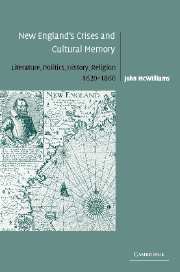Book contents
- Frontmatter
- Contents
- Acknowledgments
- Introduction: Crisis rhetoric: exclusion in New England history
- PART ONE PLANTATION AND SETTLEMENT
- PART TWO TIME OF TROUBLES
- PART THREE REVOLUTION
- Headnote
- 7 Boston revolt and Puritan restoration: 1760–1775
- 8 Shots heard round the world
- 9 Abolition, “white slavery,” and regional pride
- Epilogue: “bodiless echoes”
- Notes
- Index
8 - Shots heard round the world
Published online by Cambridge University Press: 22 September 2009
- Frontmatter
- Contents
- Acknowledgments
- Introduction: Crisis rhetoric: exclusion in New England history
- PART ONE PLANTATION AND SETTLEMENT
- PART TWO TIME OF TROUBLES
- PART THREE REVOLUTION
- Headnote
- 7 Boston revolt and Puritan restoration: 1760–1775
- 8 Shots heard round the world
- 9 Abolition, “white slavery,” and regional pride
- Epilogue: “bodiless echoes”
- Notes
- Index
Summary
Because studies of the American Revolution understandably focus on politics, they are apt to slight the impact of military narratives in forming cultural values and national identity. In New England, the starting point for such narratives was self-evident. Sam Adams's and Joseph Warren's justification for the Revolution, whether regressive or progressive, had claimed the high ground of self-defense; the sons of Puritan forefathers were to defend chartered liberty at all costs. New Englanders were never to seem the aggressor. Whether their weapons were words or guns, they were to claim loyalty while acting for liberty, to respond to tyranny rather than to initiate change.
The Suffolk Resolves, while stopping short of declaring independence, had sanctioned defensive activities of the most aggressive sort. But before national independence would be declared in July 1776, New Englanders would push well over even those limits. Expanding on Artillery Company tradition, they would cultivate military preparedness, organize themselves into regiments, and march many miles to fire muskets at battle sites soon celebrated in regional, national, and even world history. Within the context of defending Puritan liberties, how would it be possible to justify the ambushing of British soldiers from behind a stone wall (Concord Fight), or the seizing of a British fort through a surprise attack at dawn (Ticonderoga), or assuming an advanced hilltop position, probably against orders, in order to shell the British army in Boston (Bunker Hill)?
- Type
- Chapter
- Information
- New England's Crises and Cultural MemoryLiterature, Politics, History, Religion, 1620–1860, pp. 227 - 257Publisher: Cambridge University PressPrint publication year: 2004

